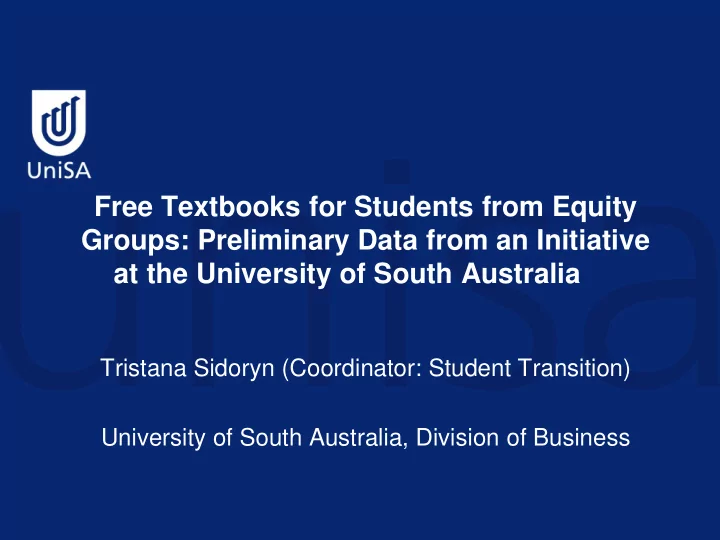

Free Textbooks for Students from Equity Groups: Preliminary Data from an Initiative at the University of South Australia Tristana Sidoryn (Coordinator: Student Transition) University of South Australia, Division of Business
Outline of Session • University context • Overview of the Free Textbooks Initiative • Results – retention, success and satisfaction rates • Discussion - How other institutions have implemented projects to support students from equity groups
University of South Australia Context • 33,000 students • 10,500 in Business School • Culturally diverse domestic student population and 28% international students • Mission statement - Focus on “achieving equitable educational access and outcomes across our diverse student community”
Overview – Free Textbooks Initiative • The financial costs associated with higher education can be a major deterrent to students successfully completing their studies • Australasian Survey of Student Engagement - 26% of first year students who left university without a degree indicated that their departure was due to financial reasons or to reduce study costs • US National Survey of Student Engagement – similar results regarding students dropping out of university due to financial reasons
Overview – Free Textbooks Initiative • In 2010 there were 8 new core business subjects • There were concerns that students from equity groups would have difficulty purchasing the textbooks (approximately $500 per semester) • With the new subjects came new textbooks - limited second-hand textbooks • The Free Textbooks Initiative was proposed to assist students from particular equity groups: • Indigenous • Rural • Low-socioeconomic status (Low-SES)
Administering the Free Textbooks Initiative • The textbooks were purchased – 200 copies of the textbooks for each of the eight subjects - $138,238 • Students were notified if they were eligible to receive the free textbooks • They could either collect the textbooks (mainly during Orientation) or have them mailed if they were studying online • In Semester 2 2010 there were 176 students eligible to receive the free textbooks
Administering the Free Textbooks Initiative Table 1: The number of students eligible for the initiative in Semester 2 2010 Equity Group Total Eligible & Student Numbers Who Collected of Students Active Textbooks Com Cont Com (%) Cont (%) 107 0 Rural 136 0 78.68% 0 8 9 Indigenous 14 16 57.14% 56.25% 4 3 Low-SES 4 6 100% 50% 119 77.27% 12 54.55% Total 154 22 Please note that not all the students were enrolled in the core business subjects and thus although they were eligible they did not access the Free Textbooks Initiative. * Com (Commencing/New students) and Cont (Continuing/Senior level students)
Accepting on offer at UniSA Table 2: University offers translating to acceptances SP2 2009 SP2 2010 Rural/Isolated Offers 258 261 Rural/Isolated 129 (50%) 158 (60.53%) Acceptances • There was an increase of rural student acceptances of 10.53% • Please note that some Indigenous and Low-SES students have an alternate entry and do not apply via the usual pathway
Retention Table 3: Retention Rates 2009 and 2010 Equity Group 2009 2010 79.72% 74.21% Overall Rural/Isolated 72.44% 81.25% Indigenous Com Cont Com Cont 71.43% 72.22% 87.50% 100% Low-SES Com Cont Com Cont 33.33% 81.81% 66.66% 81.81%
Success Rates Table 4: Success Rates 2009 and 2010 Equity Group 2009 2010 Overall 79.21% 78.33% Rural/Isolated 79.08% 84.92% Indigenous Com Cont Com Cont 62.5% 80% 88.88% 66.66% Low-SES Com Cont Com Cont 0% 70% 66.66% 62.5%
Satisfaction – Survey Results Key findings • 19% of students indicated that the free textbooks initiative influenced their decision to accept an offer at UniSA. • 42% highlighted that without the free textbook scheme they would not have purchased all the core textbooks. • 10% of students indicated that without the free textbook scheme they may have considered dropping out of university. • 69% of students outlined that access to the free textbooks enabled them to obtain better grades. • 90% of students were satisfied with the free textbooks initiative.
Satisfaction – Survey Results • “I’m a single mother and having to purchase all of my textbooks would have caused me quite a lot of financial stress as I did not realise how expensive they were. The free textbook initiative helped me enormously and made my university experience more enjoyable. ” • “The Free Textbooks initiative was excellent. It would be great to see more initiatives like this. ”
Satisfaction – Survey Results • “If it wasn't for the initiative, I would not have been able to afford textbooks. ” • “I think it's a great idea, a lot of people at uni don't purchase the books and I can't imagine I would do very well if I didn't because I used my a lot! They are generally very expensive and a lot of people can't afford them, I think more initiatives like this should be in place."
Where to from here? • Looking at further approaches – such as iPads with the textbooks downloaded • Further investigation – focus groups, looking at suggestions from students from equity groups on strategies to support them
Discussion • How have other institutions implemented projects to support students from equity groups?
Conclusion 1 + 1 + 2 +… This is a retention initiative and is used in conjunction with multiple retention strategies (Orientation program, student mentoring, academic mentoring) • The importance of implementing multiple strategies Thank you for your participation in this session.
Recommend
More recommend